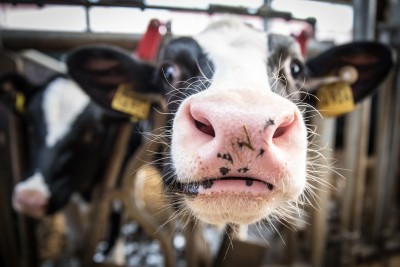Keeping Dairy Calves Cool in Warm Weather
Alycia Drwencke, Dairy Management Specialist
Southwest New York Dairy, Livestock and Field Crops Program

Keeping Dairy Calves Cool in Warm Weather
Cornell Cooperative Extension shares information on the benefits of providing heat abatement to calves
By Alycia Drwencke, Dairy Management Specialist, with the SWNY Dairy, Livestock and Field Crops Program
SOUTHWEST NEW YORK (May 20, 2021) - Cornell Cooperative Extension's Southwest New York Dairy, Livestock and Field Crops Program (SWNYDLFC) shares information on the benefits of keeping dairy calves cool for the 2021 season.
Traditionally, conversations around cooling on dairy farms have focused on the lactating portion of the herd. This is in part due to the added body heat that milk production has on cows, but also to improve efficiency as heat stress can decrease milk yield. As research evolves and weather patterns change, the importance of keeping dairy calves cool is becoming clearer.
Thanks to research that has been published throughout the last 10 years there is a better understanding of how warm weather can affect dairy calves. Interestingly, calves can experience negative effects of warm weather both before they are born and after. If a calf's mother is heat stressed before birth, the calf will have decreased milk production throughout her life, lower body weight at birth through weaning, impaired immunity and less effective absorption of immunoglobulins from colostrum. Additionally, these calves will have daughters that produce less milk underlining the long term effects of heat stress. If a calf is not provided cooling after birth, they will eat and grow less, have increased instances of illness and decreased immunity. These negative effects highlight the importance of making sure dry cows are cooled with shade, fans and spray water leading up to birth and once calves are born they are provided shade and fans for cooling.
To assist with keeping calves cool they should be provided ample amounts of clean, cool water. If calves are housed in hutches, providing shade cloth or reflective tarps over their shelter is beneficial. Additionally, orienting shelters to take advantage of the prevailing winds and promote air flow is ideal. Other ways of increasing airflow in the shelter will also help with keeping calves cool, such as opening windows or vents, propping hutches on cinder blocks and adding fans. When calves are in a barn it is important to look at the ventilation and provide fans. Finally, the bedding material and cleanliness can influence calf cooling. Using bedding that holds less heat, such as sand, rice hulls, or sawdust and keeping it clean can promote better cooling for calves.
When calves are cooled effectively it will prevent rises in respiration rate and body temperature, prevent panting, and promote solid feed and milk intake. Calves should be monitored for signs of heat stress when the temperature-humidity index reaches 68 or higher (approximately 75 degrees Fahrenheit with 20% humidity). Cooling calves with shade and fans can promote their health and productivity throughout their life. For more information about cooling for dairy calves, contact Alycia Drwencke, Dairy Management Specialist, at 517-416-0386 or amd453@cornell.edu.
Keeping Calves Cool (pdf; 868KB)
Upcoming Events
Boots in the Barn: Cornell Dairy Research Updates
January 13, 2026
January 20, 2026
January 27, 2026
February 3, 2026
February 10, 2026
February 17, 2026
February 24, 2026
Join us for some or all!
Advanced Hoof Health Program
January 15, 2026
Belfast, NY
Who should attend?
- Professional hoof trimmers
- Dairy farm owners or managers in charge of farm foot health
Topics include:
- How to Create a Strategic Trimming Program for your Dairy
- The Latest in Lameness Technology for the Dairy Industry
- Housing and Flooring Design: Its Role in Hoof Care
NY Pork Producers Connection Breakfast - Geneseo
January 17, 2026 : Pork Producers Connection Breakfast - Geneseo
Geneseo, NY
All pork producers are invited to join the New York Pork Producers for a free hot farmer's breakfast, at which they'll catch up on topics including the pork to dairy barn conversion series, NYPP digital campaigns, and 840-RFID tags.
Announcements
Cows, Crops & Critters Newsletter Sponsorship
TRYING TO REACH GROWERS AND AGRIBUSINESSES IN OUR SOUTHWEST REGION OF NEW YORK?Weekly Email Update: Shared with 625+ households who have signed up with our program.
Monthly Paper Mailer: To reach our stakeholders and farmers who lack internet access, we send out a monthly mailer where your company's logo and contact information would be featured with a mailing list of 330+ households.
If you sponsor our weekly and monthly publications you reach approximately 955 households.





